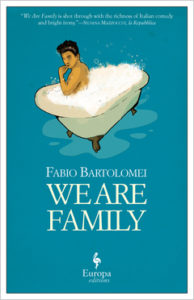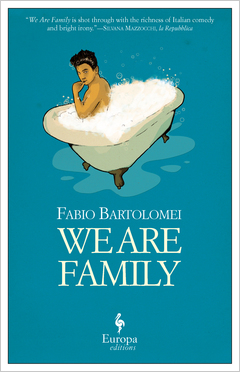Since last night I haven’t done a thing to save the world. While Sister Taddea tells us one of her stories with an unhappy ending, I think back to my expedition into the enemy encampment and to one phrase in particular that I overheard: “He needs to find his own way.” The meaning is clear, I have to figure out what particular route will allow me to save the world, but the word “way” for some reason makes my thoughts turn strange and I imagine the way as a street, paved with asphalt, with white lines painted on it. Perhaps my way is just like the promised home of the Santamaria family, maybe it’s hidden somewhere and I ought to go out every Sunday to look for it. Mario Elvis said that we’ll recognize the promised home the minute we see it, as soon as we set foot in it, we’ll know if it’s the right place or not. It probably works more or less the same when it comes to my way. Then there’s another thing I don’t understand: Why does the world need to be saved? What is it that isn’t working? Evidently things aren’t working out there the way they are at my house, maybe not all the Papàs start the day by singing Elvis songs, not all the Mammas make chocolate ciambelloni, not all the families play with a fine German tape recorder. I need to learn more, I need to study.
“She looks like Snow White,” Roberta whispers behind me.
Sister Taddea has projected onto the wall the picture of a woman dressed in white and light blue.
“It’s Saint Lucy,” I reply.
The saint has a handful of greenery and a little plate in the other hand. She must have been a cooking saint. Like all the religious superheroes she is looking upward, because she knows that all trouble will come to her from that direction.
“Why are they dressed the same?”
“Bec-c-cause Saint Lucy wants to get engaged to the prince but Snow White finds out and scratches her eyes out.”
“That’s not true.” “Wait and see.”
“Almerico and Roberta! Aren’t you interested in the story of Saint Lucy?” Sister Taddea asks us.
“Yes, we are,” we reply.
“Knowing about the lives of the saints will be a big help when you grow up. You, Roberta, what do want to be when you grow up?”
“A saint.”
Sister Taddea smiles and nods. Here’s the first lesson that will come in handy when we grow up: it’s not important to tell the truth, what counts is to always say what will make other people happy.
“What about you, Almerico?”
“I’m a genius, I’ll probably save the world, but I still need to find my way.”
From the look on Sister Taddea’s face it occurs to me that I haven’t been as good at answering as Roberta was. The nuns aren’t bad people, they’re just obsessed with this matter of good and bad. Goodish and baddish don’t exist, on any given question there’s always the risk of getting it wrong and winding up in hell. To say you want to have the same job as your Papà or be a soccer player or a doctor is good, to say that you’re a genius and you want to save the world is bad. Normal is good, genius is bad.
“Oh no, sorry, I want to be a fireman,” I correct myself.
Right answer, the nun smiles.
“Good boy, firemen do a very useful job, they save people.” I didn’t tell a lie, being a fireman really is the job that I wanted to do before finding out I’m a genius. So it’s not really a lie, it’s more like a postdated truth. I can’t disappoint Agnese and Mario Elvis, I can’t disappoint the world. I’ll become a genius and a savior, and a fireman if I have any spare time.
I’m not happy with my body. The brain transmits commands and my body never seems capable of responding properly. The order is: “Run!” and the legs start spinning out of control, skidding, reaching a decent speed only once they start following the head as it falls forward. Stopping is always a problem. Asphalt, cobblestones, and marble are all hard materials that I learned to recognize early, the ones I scrape my elbows and knees on every day on account of Ezio, a mean kid that even the fifth graders steer clear of. The fifth graders, though, have no reason to run when they see him, because his favorite target is me. Ezio has lazy, troublesome speech, when he talks you can’t understand a thing, so he’s gotten used to saying the things he thinks with gestures. But since his thoughts are always nasty, the way he gestures is to slap, shove, and trip you. Outdoor recess is never a happy thing. We leave the classroom in double file, we walk down the stairs, we join the other classes, we cross the courtyard stamping our feet hard on the ground the way the nun tells us to, and if you ask me she’s an outstanding general. As soon as the nun tells us to go play, my brain orders my body to vanish as fast as a missile. After losing my balance on the wet grass, after running straight into a tree that jumped out in front of me, and after falling to my knees in an effort to catch up with my head—and at least my head has the right idea and moves fast—I take refuge in the furthest corner of the garden, next to a high metal gate that leads out onto the street. I’ve inhaled
so much cold air all at once that now I feel as if I have a saliva-flavored popsicle stuck in my throat. Luckily, Ezio is nowhere in sight. Right now there must be another little boy in the courtyard trying to understand the meaning of: “Your sandwich mine now I’ll smack your face.” But I make the grave error of failing to vanish behind the bush, Roberta spots me and comes running in my direction. She has very long black hair, green eyes, and a very obedient body. She doesn’t slip on the grass, she avoids trees, she stops in front of the gate with a nice graceful leap. Her cheeks seem to be colored with that stuff they put in candy to make it clear that it’s strawberry flavored, a lock of hair is stuck to her lips. She smiles at me, I don’t respond otherwise she might get the idea that she can stay here with me. She taps my shoulder with a finger, I don’t turn around otherwise she might get the idea that she can talk to me.
“My mother says that your father is a clown.” “No, he’s a top-ranking astronaut,” I tell her. “Ah, too bad.”
“Hey, look, being a top-ranking astronaut is a very g-g-good job. He’ll go to the moon and to Mars, too!”
Every time I happen to be close to Roberta at the front door, some parent will ask if we’re going steady. I don’t think I’m ready for that, even though I know everything there is to know about girls: when you choose up teams you always pick them last; better leave them alone because they’ll start crying at the drop of a hat and the nuns have giant hands; when they play with dolls they always make little voices, unpleasant ones for her and idiotic ones for him; they’re always looking for some excuse to kiss you and leave a wet patch on your cheeks.
“What are you doing here?” she asks me.
I’d almost forgotten: they always ask you: “What are you doing? Where are you going? What are you thinking about?”
“I’m t-t-trying to find my way.”
She puts her head between the bars of the gate. She looks outside.
“Is that it?”
“I d-d-don’t think so. My way must be really wide and lined with trees.”
“Downstairs from where I live, there’s a way like that.” “Well, then, starting today, you and me are engaged. It must
be destiny.”
“What does that mean?”
Destiny is the person who makes things happen, but how can you explain that to a girl?
“It means that you have to g-g-give me your hand.” She looks at me.
“And what are you going to give me in exchange?”
__________________________________
 From We Are Family. Used with permission of Europa Editions. Copyright © 2019 by Fabio Bartolomei, translation copyright © 2019 by Antony Shugaar.
From We Are Family. Used with permission of Europa Editions. Copyright © 2019 by Fabio Bartolomei, translation copyright © 2019 by Antony Shugaar.













